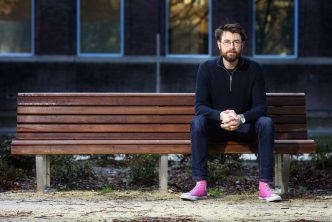A group of around 10 TU Delft employees has been working on a ‘moral deliberation’ on the ties with Israeli institutions since March. They will issue advice before summer. Until then, the position of the Executive Board will remain unchanged. Meanwhile, a memorial tree on campus was vandalised for the second time.
Demonstration on campus on 25 May. (Photo: Thijs van Reeuwijk)
The Executive Board established this moral deliberation on 1 October 2024 , but has not publicised it. This transpired from the answers to questions that Delta posed to the Executive Board and to Ibo van de Poel, the Integrity Officer and Professor of Ethics and Technology.
Van de Poel says that ‘the moral deliberation concentrates on the desirability of international partnerships in light of the Israel-Gaza conflict’. He said that the moral deliberation room consists of ‘about 10’ TU Delft staff members. He could not say who they are. He emails that ‘The agreement was made that the names would not be made public to avoid people being put under pressure or badly treated’.
Diverse composition
What he does state is that the group is diverse ‘in terms of faculties and services, gender, nationality, academic staff, administrative and support staff, students, and the type of position at TU Delft’. Van de Poel explains that to join a moral deliberation room ‘it is not necessary to have expertise’ in the area of subjects such as international law, human rights, and the Israel-Palestine conflict. ‘However, the members are trained in the methodology (in Dutch) and all the meetings are prepared so that all the participants have the relevant information.’
The members came together three times in March and April to discuss a particular partnership. In preparation they received reports or summaries deemed relevant. Van de Poel says that these include United Nations’ and human rights organisations’ publications and verdicts of the International Criminal Court.
Advice issued before summer
Van de Poel adds that ‘Just to clarify, the task of the moral deliberation room was not to evaluate the legal situation in relation to Israel-Gaza, but to come up with a moral judgement about what TU Delft should do in relation to partnerships in the light of relevant observations of institutions of authority about the situation in Israel-Gaza.’
He says that the moral deliberation room will issue its advice before summer. It is then up to the Executive Board whether to change its position or not. Its position is described in a statement issued exactly one year ago. In it, the Executive Board says that it does not wish to reassess the ties with Israeli institutions.
The main story continues below the picture.
Olive tree near aula uprooted again

On 14 June 2024, activists from Delft Student Intifada (DSI) planted an olive tree on the lawn between the aula and the TU Delft Library. Although it had not been consulted, the TU allowed it to stay. However, it was vandalised earlier this year, after which it was replanted on 5 May. Recently, it was uprooted again. TU Delft could not yet be reached for comment.
Protests
In the meantime, experts (in Dutch) are talking about genocide in Gaza ever more loudly. They point out that under international law the international community must avoid genocide and must not wait until the International Court takes a definitive stand. The leaders of Canada, the United Kingdom and France threaten to impose sanctions ‘if Israel does not cease the renewed military offensive and lift its restrictions on humanitarian aid’. The Minister of Foreign Affairs Veldkamp recently also carefully drew a line in the sand (in Dutch).
Further, other university executive boards are starting to shift their positions. Last week Utrecht University’s executive board chair spoke about ‘genocidal violence‘ in Gaza, although this does not mean that it will break all their ties. Because of this, activists again occupied a building at Utrecht University on 19 May leading to police taking action.
In the meantime, in a petition students and staff members at all the universities are calling for ‘ties with genocide’ to be broken. They add ‘refuse police on campus!’. Nearly 700 people, including TU Delft students and staff members, have signed the petition.
‘Well thought through and considered’
Through a spokesperson, the TU Delft Executive Board said that ‘The situation in Gaza is terrible. That will not have escaped anybody’. But this does not mean that the Executive Board will adopt a new position at this point in time.
It is awaiting the advice of the moral deliberation room ‘in order to come to a well thought through and considered position’. ‘Of course we are watching what happens outside, but we must weigh up the moral issues ourselves. This is what the moral deliberation room was set up for.’
Meeting on 22 May
On 22 May, Delft Student Intifada is organising the meeting “Educate to Liberate”. There, too, TU Delft’s ties with Israeli institutions will be discussed. It will include a lecture by Dr Maya Wind, the Israeli anthropologist and author of the book Towers of Ivory and Steel on the intertwining of universities and the military in Israel.
Do you have a question or comment about this article?
s.m.bonger@tudelft.nl




Comments are closed.